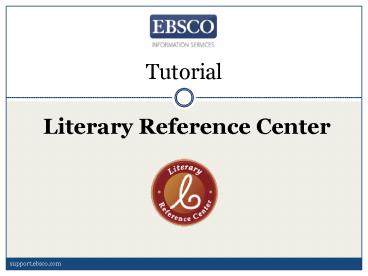Literary Reference Center - PowerPoint PPT Presentation
1 / 16
Title:
Literary Reference Center
Description:
Literary Reference Center support.ebsco.com Welcome to EBSCO s Literary Reference Center tutorial. Literary Reference Center is a comprehensive database that ... – PowerPoint PPT presentation
Number of Views:103
Avg rating:3.0/5.0
Title: Literary Reference Center
1
Tutorial
- Literary Reference Center
support.ebsco.com
2
Welcome to EBSCOs Literary Reference Center
tutorial. Literary Reference Center is a
comprehensive database that provides users with a
broad spectrum of information on thousands of
writers and their works across literary genres.
In this tutorial, we will conduct a basic search,
review some of the available browsing options,
and explore the databases unique features.
3
Lets begin by conducting a search from the Basic
Search screen. Enter your search term(s) in the
Find field. Select the keyword, author, or title
from the drop-down menu, and click Search.
4
By default, your search results will appear in
order of relevance, but you can also sort
articles by source, author, or date. Use the
Source Type facets in the left-hand column to
limit your results to Magazines, Reviews,
Literary Criticism, Reference Books, or Full Text
Classics. Clicking one or more Source Types will
automatically update your list of search results.
5
Click on a Full Text link to view the full text
article, or click the title to view details about
the article. Dont have time to read it now? Sign
In to your personal account and click the Add to
Folder icon to save the article to your personal
folder.
6
PDF Full Text displays in the PDF Full Text
Viewer. From here, you can Print, E-mail, Cite,
Export, or Add the result to your Folder by
clicking the corresponding icons under the Tools
menu on the right. You can print or save the
article to your computer by using the icons found
in the Adobe Reader toolbar. To see citation and
summary information for the article, click
Detailed Record.
7
You can also browse Literary Reference Center
content in other ways. The Browse box, on the
left of the home screen, allows you to browse
most studied works and authors, as well as
full-text classics. Lets begin with Most Studied
Authors.
8
Click Most Studied Authors in the Browse box.
From the Most Studied Authors screen, click on
the tabs to browse authors by specific traits
such as Country, Culture, Genre or Movement. You
can peruse the categories alphabetically or type
your search term(s) in the field provided and
click the Browse button.
9
For example, select the Movement tab. Type
realism in the Find field and click the Browse
button to display a list of Most Studied Authors
from the Realism movement. Click an author name
to view a detailed record that includes a
biography, a list of principal works, discussion
topics, and more. Return to the home screen to
browse Most Studied Works, All Authors, All
Works, and Full-Text Classics in the same way.
10
The Reference Shelf area on the home screen
includes helpful resources for both students and
teachers. For example, students can click
Citation Help for information on citing sources
or Research Guide for tips on writing a research
paper. The Curriculum Standards link launches a
module that allows teachers to browse specific
benchmarks, many of which have recommended search
strings for successful content retrieval.
11
The Book Highlight carousel features reference
books from the Critical Insights series that are
rotated regularly. The Content Spotlight,
Featured Work, and Featured Author areas are
constantly reviewed to highlight the most
relevant literary works, people, and events.
12
Literary Reference Center also offers a robust,
searchable image collection. Hover your cursor
over More in the top toolbar, then select Images.
13
On the Literary Image Collection search screen,
enter your search term in the Find field. Under
Limit your results, you can narrow your results
by Image Type, such as black and white
photograph, color photograph, or illustration.
Once you have made your selections, click Search.
14
From the result list, you can click on the image
to view a larger version, or add the image to
your personal folder.
15
To view the complete online Help system, click
the Help link at the top right of the Literary
Reference Center screen.
16
(No Transcript)































